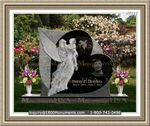|
What To Know When Considering Car Funeral Flags
A great many small details need be attended when one is charged with planning a loved one's final arrangements. Among these is ensuring that all the bereaved are able to find the interment site when memorial services are held at a different location. One way to do this is to use funeral flags and everyone travel as a group from one place to another.
The parade of mourners following the remains of an individual from the location of services to the site of interment is known as a procession. In some cultures it consists of people walking and carrying the body to its final resting place, though more commonly it is a line of vehicles. The chain is led by the hearse with the deceased inside.
As the person of honor, the deceased is carried in the hearse that leads the group. The limousine, or whatever vehicle is being used to transport their spouse, significant other, parents or children will take up second position in the line. They are followed by other family members and the rest of the guests in their own automobiles.
Though many times funerary processions are granted a police escort to ensure the group travels uninterrupted, additional methods may also be used. Banners, normally supplied by the Home handling the arrangements, are a traditional way to identify those included in the group. There are several different styles available.
Many services utilize banners that wrap across the hood of the vehicle like a large ribbon. Still others opt to use a version that has the pennant attached to a plastic staff that is held up by the car door window. Yet another option are those mounted on a magnetic base that adheres securely to most any metal or vinyl automobile top.
Products of this type typically stand nearly a foot tall and use flexible staffs to prevent breakage from strong winds. The banners are usually about 6 x 9 inches which makes them easy to see. Color options may vary with some of the more common options being purple, white and orange, all with contrasting crosses centered on them.
|
|



























